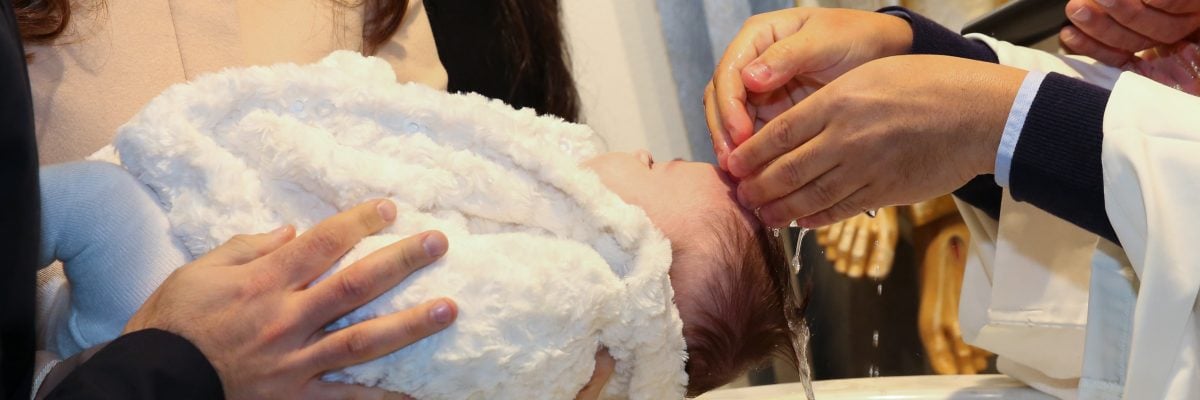Infant Baptism
Since the
New Testament era, the Catholic Church has always understood baptism differently, teaching that it is a sacrament which accomplishes several things, the first of which is the remission of sin, both original sin and actual sin—only original sin in the case of infants and young children, since they are incapable of actual sin; and both original and actual sin in the case of older persons.
Peter explained what happens at baptism when he said, “Repent, and be baptized every one of you in the name of Jesus Christ for the forgiveness of your sins; and you shall receive the gift of the Holy Spirit” (Acts 2:38). But he did not restrict this teaching to adults. He added, “For the promise is to you and to your children and to all that are far off, every one whom the Lord our God calls to him” (2:39, emphasis added). We also read: “Rise and be baptized, and wash away your sins, calling on his name” (Acts 22:16). These commands are universal, not restricted to adults. Further, these commands make clear the necessary connection between baptism and salvation, a connection explicitly stated in 1 Peter 3:21: “Baptism . . . now saves you, not as a removal of dirt from the body but as an appeal to God for a clear conscience, through the resurrection of Jesus Christ.”
FROM the section Christ Calls All to Baptism
Opposition to infant baptism is not a new phenomenon. In the Middle Ages, some groups developed that rejected infant baptism, e.g., the Waldenses and Catharists. Later, the Anabaptists (“re-baptizers”) echoed them, claiming that infants are incapable of being baptized validly.
But the historic Christian Church has always held that Christ’s law applies to infants as well as adults, for Jesus said that no one can enter heaven unless he has been born again of water and the Holy Spirit (John 3:5). His words can be taken to apply to anyone capable of belonging to his kingdom.
He asserted such even for children: “Let the children come to me, and do not hinder them; for to such belongs the kingdom of heaven” (Matt. 19:14).
FROM the section In Place of Circumcision
Furthermore,
Paul notes that baptism has replaced circumcision (Col. 2:11–12). In that passage, he refers to baptism as “the circumcision of Christ” and “the circumcision made without hands.” Of course, usually only infants were circumcised under the Old Law; circumcision of adults was rare, since there were few converts to Judaism.
If Paul meant to exclude infants, he would not have chosen circumcision as a parallel for baptism.
This comparison between who could receive baptism and circumcision is an appropriate one. In the Old Testament, if a man wanted to become a Jew, he had to believe in the God of Israel and be circumcised. In the New Testament, if one wants to become a Christian, one must believe in God and Jesus and be baptized. In the Old Testament, those born into Jewish households could be circumcised in anticipation of the Jewish faith in which they would be raised. Thus, in the New Testament, those born in Christian households can be baptized in anticipation of the Christian faith in which they will be raised. The pattern is the same
FROM the section Were Only Adults Baptised
Fundamentalists are reluctant to admit that the Bible nowhere says baptism is to be restricted to adults, but when pressed, they will. They just conclude that is what it should be taken as meaning, even if the text does not explicitly support such a view. Naturally enough, the people whose baptisms we read about in Scripture are adults, because they were converted as adults. This makes sense, because Christianity was just beginning—there were no “cradle Christians.”.
Even in the books of the New Testament that were written later in the first century, during the time when children were raised in the first Christian homes, we never—not even once—find an example of a child raised in a Christian home who is baptized only upon making a “decision for Christ.” Rather, it is always assumed that the children of Christian homes are already Christians, that they have already been “baptized into Christ” (Rom. 6:3). If infant baptism were not the rule, then we should have references to the children of Christian parents joining the Church only after they had come to the age of reason, and there are no such records in the Bible.
FROM the section Specific Bible References
But one might ask, does the Bible ever say that infants or young children can be baptized? The indications are clear. In the New Testament we read that Lydia was converted by Paul’s preaching and that “She was baptized, with her household” (Acts 16:15). The Philippian jailer whom Paul and Silas had converted to the faith was baptized that night along with his household. We are told that “the same hour of the night . . . he was baptized, with all his family” (Acts 16:33). And in his greetings to the Corinthians, Paul recalled that, “I did baptize also the household of Stephanas” (1 Cor. 1:16).
In all these cases, whole households or families were baptized. This means more than just the spouse; the children too were included. If the text of Acts referred simply to the Philippian jailer and his wife, then we would read that “he and his wife were baptized,” but we do not. Thus his children must have been baptized as well. The same applies to the other cases of household baptism in Scripture.

